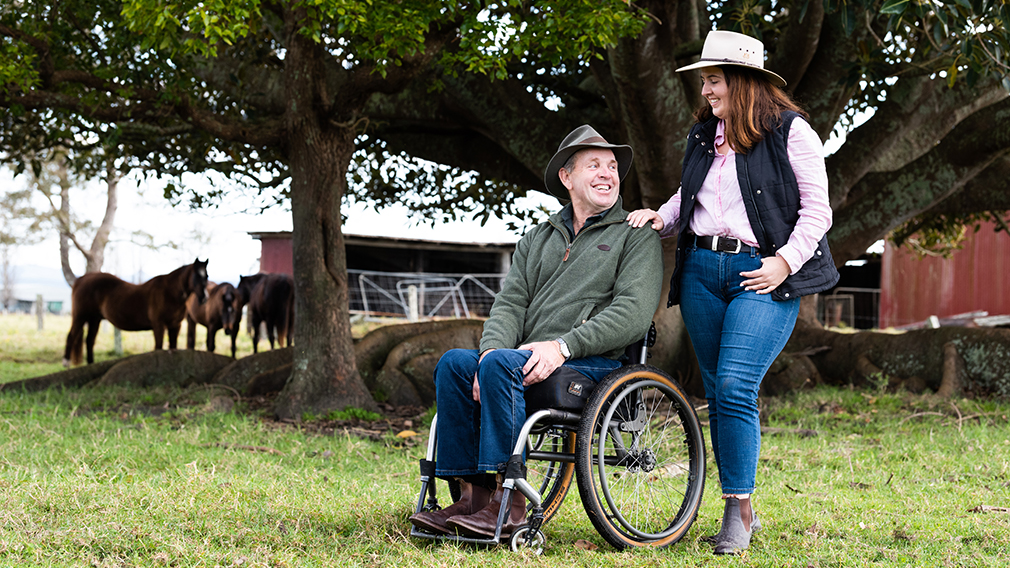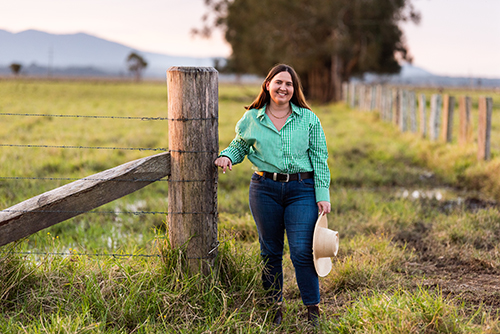Family ordeal inspires farm accessibility campaigner

Founder of Ability Agriculture, Josie Clarke (left), with her dad Glen at their Kempsey family farm. (Rachael Lenehan)
Josie Clarke was just five years old when her family’s lives changed forever.
Her dad Glen, 41 at the time, had been involved in a serious truck accident. He survived the crash, but the beef cattle farmer from Kempsey, NSW, sustained spinal injuries which caused paraplegia.
“It was obviously a very big life change for us,” says Clarke, now 25.
“At the time, many people thought we should sell the farm and move on to do something else, but we didn’t want to do that.”
The family stayed on their mid north coast property, Clarke and her siblings stepping up to support their mum to run the beef grazing operation, while her dad went through the tough task of adjusting to his disability.
“We had a lot of community support, which was really amazing,” Clarke recalls.
“But what was missing was someone in the agriculture industry that we could go and ask, ‘What do we do?’ ‘Who else is in a similar position?’ How can we get Dad’s buggy modified so he can get around the farm?”
Clarke’s family got on with “figuring it all out”, her dad finding ways to adapt farm and other equipment so he could keep running the business.
But over the years she noticed he faced many accessibility challenges she thought preventable.
“Like when I was at a field day and dad couldn’t go on the tour around the farm because he couldn’t get on the bus,” says Clarke, an agronomist, currently undertaking a PhD at the University of Sydney into gene editing for crop improvement.

Josie Clarke on her family's farm at Kempsey, NSW, is in the running for the national Rural Women's Award, announced Sept 6. (Rachel Lenehan)
The issue is made more acute by the higher rates of injury and disability experienced by people living in rural Australia compared to those in major cities. More than 23 per cent of those in rural and regional areas report some form of disability compared to 16.4 per cent in cities, according to the Australian Bureau of Statistics.
During a chat with her dad on a visit home in 2020, he confirmed her hunch.
“I realised that there's really no unified voice to increase awareness, opportunity and inclusivity for those with disability in agriculture,” she says.
This gave rise to the idea of Ability Agriculture, an online platform Clarke launched last year.
“For me it was how do we show greater support for people with disabilities in our industry,” says Clarke, recently named the NSW ACT winner in this year’s Agrifutures Rural Women’s Award, putting her in the running for the national crown on September 6.
“I wanted to show there are amazing people working in our industry and, yes, they do have a disability, but our industry can be accessible and can be a career option that anyone should be able to consider.
“That's what I hope the stories and voices of Ability Agriculture are getting across.”
Through the project, Clarke invites farmers from all over Australia to share their personal experiences – via Ability Agriculture’s social media community which, in its first few months grew to more than 3000 followers – of how they have adapted to make their workplaces accessible and to voice the changes they want to see.
Gayle Shann, left, with husband Mac at Cantaur Park in Central Queensland. (Ability Agriculture Instagram)
Among the growing band of contributors is Gayle Shann who, with husband Mac, runs a stud and beef cattle operation and horse breeding program, Cantaur Park, near Clermont in Central Queensland.
“Adjusting to get back on the farm was difficult of course, but soon I accepted my injuries and changes to my lifestyle as I was grateful to be alive,” shares Shann, who in 2002 at the age of 27 had a horrific accident. While replacing a fence, her glove caught on the posthole digger and she became entangled in the revolving shaft, which tore off her right arm and shoulder blade, and damaged the nerves of her left arm leaving it paralysed.
“I help out with mustering with my four-wheeler, which two generous people modified for me, and I do all the books for our business by using a giant keyboard and rollerball mouse on the floor using my feet,” she writes in her Ability Agriculture post.
Shann shares that although she’s been using an unmodified buggy to muster by having one foot on the steering wheel, the same way she drives a ute and tractor, she’s had trouble finding a company that will lower the steering to the floor on her new buggy.
“I know it’s hard to get mainstream businesses to consider manufacturing adapted equipment as we are a minority, but it’d be great to see some changes in this respect,” she writes.
Shann tells Westpac Wire Ability Agriculture is playing an important role for people with disabilities attempting to resume their life on the land.
"There is nothing better than picking the brains of other rural based people who may have similar limitations," Shann says.
"Josie has given us tools to find answers to our problems, and put us in contact with the right people. She is truly remarkable and deserves recognition for what she has done."
Nick Trethowan, a farmer from Kojonup in Western Australia, who lost his right leg at the hip due to cancer, also shared with the group how he now uses a hoist to get into machinery like his combine harvester.
Nike Trethowan from Kojonup in Western Australia. (Ability Agriculture Instagram)
“Watching a one-legged bloke get up a machinery ladder may not be pretty but once I am in the cab I am as good as any other operator,” he writes.
Trethowan also shares with the group he’s in the process of designing an improved version of his hoist with a local farm engineering company that he hopes to be commercially available for others.
“My word of advice is to try doing stuff on the farm again, rather than giving up because other people say you can’t,” he writes.
“You might not be able to do things as well, or as fast, or the way you used to, but you might be able to figure out a way to still do the job.”
Clarke says it’s an important time to be having these conversations, particularly as workforce shortages in the sector bite.
“If we think about how to make agriculture more accessible, we can meet some of those critical challenges,” she says.
While her focus for the project to date has been on amplifying voices to challenge perceptions around career opportunities for people with a disability, she’s set her sights on some bigger goals. These include integrating mentorship and support services for members of the community and, ultimately, for Ability Agriculture to become recognised as the representative voice for disability in the sector to drive better industry policy, leadership development and workforce planning outcomes. The $15,000 bursary from Westpac Clarke won through the Rural Women’s Award is supporting these goals.
Clarke’s dad Glen, who’s become a keen mountain biker and skier using modified equipment and also mentors others who’ve suffered spinal cord injuries, says he would like to see more employment opportunities in agriculture for those with disabilities.
“To be able to build a network of people in rural Australia sharing their ideas and interests is something that’s been needed (and) that’s what Ability Agriculture is helping create,” he says.
“It would have been so great for something like this to have been around when our family started going through it.”
Westpac Agribusiness is the Platinum Sponsor of the AgriFutures Rural Women’s Award. The national winner will be announced on September 6, 2022. Applications for the 2023 AgriFutures Rural Women’s Award will be open September 7 to October 19.


